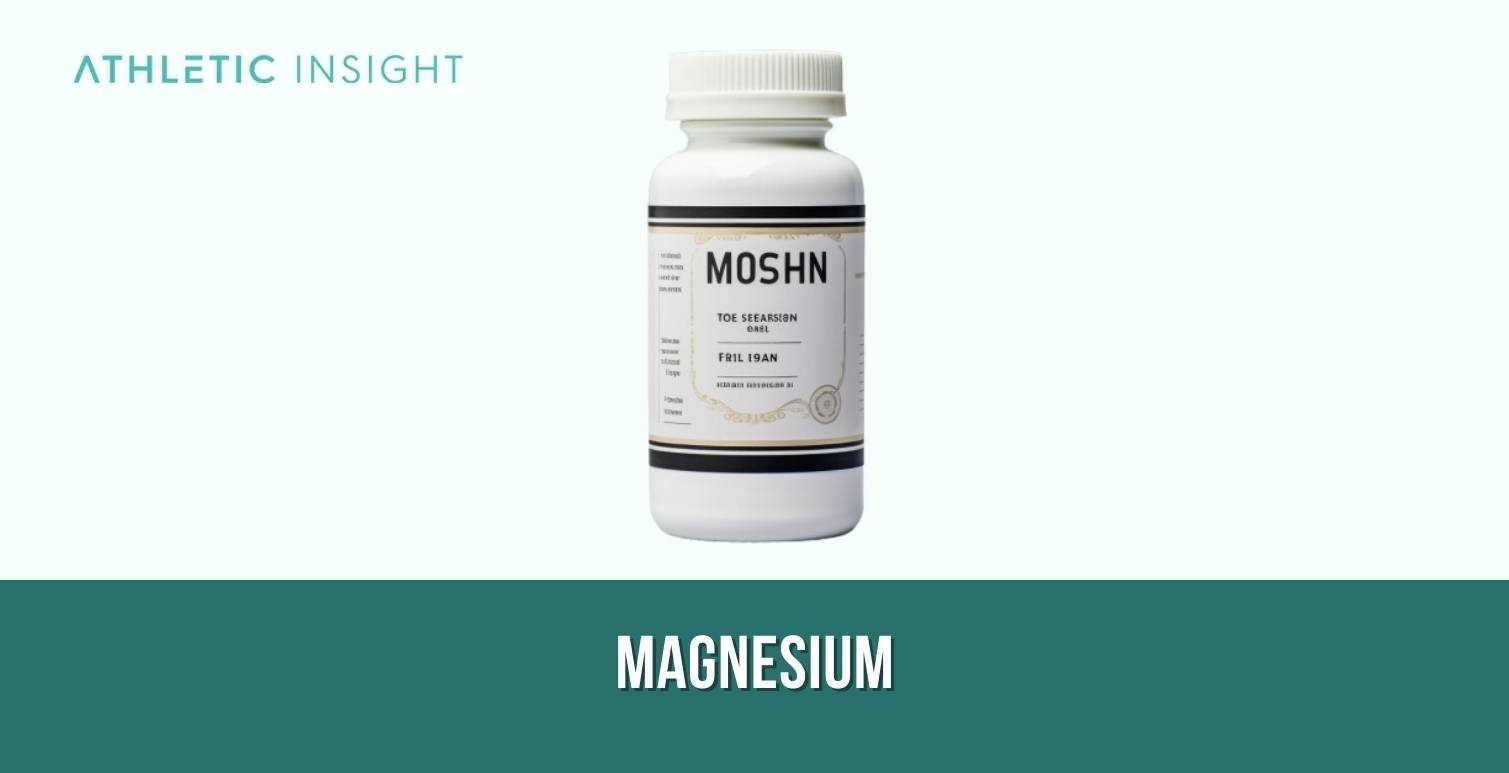The term ‘best supplements for asthma’ refers to dietary supplements that show potential in enhancing respiratory function, reducing inflammation, and relieving symptoms associated with asthma. These supplements could vary from minerals, vitamins, to herbs.
In the selection of the best supplements for asthma, several factors are considered. The supplement’s efficacy in providing relief from asthma symptoms, scientific evidence supporting its benefits, safety and potential side effects, cost-effectiveness, and user reviews are some of the key criteria.
Comparing supplements for asthma involves considering each supplement’s unique benefits and potential drawbacks, backed by scientific research, personal needs, and individual response to each supplement. Prominent among the array of supplements are caffeine, magnesium, and antioxidants, due to their beneficial properties in managing asthma symptoms.
Athletic Insight Top 3 Products
- Caffeine >>> Best Caffeine Option
- Magnesium >>> Best Magnesium Pick
- Antioxidant >>> Best Antioxidants
1. Caffeine
Caffeine, a natural stimulant found in coffee, tea, and cocoa, is known to have bronchodilatory effects, aiding in the temporary relief of asthma symptoms. The primary feature of caffeine as an asthma supplement is its ability to relax the bronchial muscles and improve airflow. The potential benefits include reduced wheezing and breathlessness.
However, excessive caffeine consumption could lead to jitteriness, insomnia, rapid heart rate, and potential dependence. Leading brands offering caffeine supplements include ProLab, NutraChamps, and Bulksupplements.
It’s essential to understand that while caffeine may provide short-term relief, it is not a substitute for prescribed asthma medications. The cost of caffeine supplements can vary based on the brand, dosage, and form. For the best source of caffeine, consider drinking Black Ink Coffee.
2. Magnesium
Magnesium, a vital mineral for numerous bodily functions, may have potential benefits for people with asthma. It contributes to muscle and nerve function, which may aid in relaxing the bronchial muscles. Common side effects are few but may include diarrhea and cramping at higher doses. Some popular brands include Thorne, Nature’s Bounty, Doctor’s Best, and Solgar.

Remember, long-term magnesium supplementation should be undertaken only under the guidance of a healthcare professional. Costs can vary depending on the brand and dosage. For the best magnesium supplements, like a trusted brand such as Thorne, the cost is less than $0.80 per serving, and less if you bundle with a subscription.
3. Antioxidants
Antioxidants are compounds that help neutralize harmful free radicals in the body, potentially reducing inflammation associated with asthma. They include vitamins C and E, selenium, and beta-carotene.
Supplementation with antioxidants may provide benefits like reduced inflammation and improved lung function. However, high doses may lead to adverse effects, including diarrhea, nausea, and stomach cramps. Top brands include NOW Foods, Nature’s Bounty, and Garden of Life.
It’s crucial to know that the long-term effects of antioxidant supplements remain inconclusive. Pricing for antioxidant supplements depends on the specific type of antioxidant, brand, and dosage.
4. Choline
Choline, an essential nutrient, shows promise in managing asthma due to its anti-inflammatory properties. It might help reduce the frequency and severity of asthma attacks.
Potential side effects may include sweating, a fishy body odor, gastrointestinal distress, and in rare cases, liver damage. Notable brands include Thorne, Nature’s Way, NOW Foods, and Jarrow Formulas.
Choline supplements are not recommended for people with liver disease without medical supervision. Costs can vary widely, depending on the form, dosage, and brand of the supplement.
5. Black Seed
Black Seed, or Nigella sativa, has been used in traditional medicine for centuries, including for conditions like asthma. Its anti-inflammatory and antioxidant properties may help reduce asthma symptoms.
Potential side effects can include allergic reactions, stomach upset, and potentially lower blood sugar levels. Top brands include Zhou Nutrition, Amazing Herbs, and Healths Harmony.
As with all supplements, it’s essential to consult with a healthcare provider before starting black seed, especially for those with a history of allergies or who are taking medication for diabetes. Costs can vary based on the brand, form, and dosage of the supplement.
6. Pycnogenol
Pycnogenol, an extract derived from the bark of the French maritime pine tree, has anti-inflammatory and antioxidant properties. Studies suggest that it may help to reduce asthma symptoms and improve lung function.
Potential side effects include dizziness, gut problems, and potential interactions with certain medications. Leading brands offering Pycnogenol include Now Foods, Healthy Origins, and Source Naturals.
Before taking Pycnogenol, one must ensure to discuss with a healthcare provider, particularly those with autoimmune conditions or who are on anticoagulant medications. The cost of Pycnogenol can be relatively high compared to other supplements, largely due to the extraction process.
7. Thymol
Thymol, a component of the herb thyme, has been used in traditional medicine for respiratory conditions like asthma due to its bronchodilatory and anti-inflammatory properties.
Thymol might help reduce inflammation and improve lung function. However, high doses can lead to nausea, vomiting, and potential liver problems. Top brands include Bioactive Nutrients, SVA Organics, and Zongle Therapeutics.
It’s crucial to use thymol under the guidance of a healthcare provider, especially for those with liver problems or pregnant women. The cost of thymol can vary based on the brand, form, and dosage.
What is an Asthma Supplement?
An asthma supplement refers to a dietary supplement taken with the intention of managing symptoms of asthma or improving overall lung health. These supplements can come in the form of minerals, vitamins, herbs, and other natural compounds that have been found to potentially benefit individuals with asthma.

What is the Purpose of Asthma Supplements?
The primary purpose of asthma supplements is to complement traditional asthma treatments by potentially enhancing respiratory health, reducing inflammation, and mitigating symptoms of asthma. However, they are not intended to replace prescribed medications but serve as an adjunctive therapy.
Who should take Asthma Supplements?
While anyone suffering from asthma can consider taking asthma supplements, they should do so only under the guidance of a healthcare professional. Also, individuals looking to enhance their overall respiratory health might benefit from these supplements.
What are the Effects of Asthma Supplements?
Asthma supplements can potentially provide several effects. They might help to improve lung function, reduce inflammation, and alleviate the frequency and severity of asthma attacks. However, it’s important to remember that individual response can vary, and these supplements are not a cure for asthma.
How Do Asthma Supplements Function?
Asthma supplements function in different ways depending on their specific properties. For instance, some may help to relax the muscles around the airways (bronchodilators), others may reduce inflammation, and some may boost overall lung health through antioxidant effects.
Are Asthma Supplements Beneficial?
Yes, asthma supplements can be beneficial as an adjunctive therapy. They may help manage symptoms, reduce the frequency of asthma attacks, and enhance overall respiratory health. However, it’s essential to remember that supplements should not replace traditional asthma medication but should be used under the supervision of a healthcare professional.
How to Use Asthma Supplements Safely?
The safety and efficacy of asthma supplements largely hinge on their proper usage. Start by consulting a healthcare provider before adding any supplement to your regime. This professional advice is paramount, considering that some supplements can interact with prescribed medications or may not be suitable for everyone, especially those with specific medical conditions or who are pregnant.

Adhere strictly to the recommended dosage, as excessive intake of some supplements can lead to adverse effects. For instance, while magnesium is generally considered safe, excessive amounts can cause diarrhea and abdominal cramping. Also, be sure to procure supplements from reputable brands to ensure you’re consuming high-quality, pure, and safe products.
Lastly, maintain realistic expectations. Supplements can aid in managing symptoms and improving lung function, but they are not a cure for asthma. Consistently adhering to your prescribed asthma treatment plan remains fundamental.
What to Look for in Asthma Supplements?
In selecting an asthma supplement, several factors warrant consideration. Start by examining the ingredient list to ensure that it contains the right components in effective amounts. Avoid products with unnecessary fillers or additives.
Next, consider the brand’s reputation. Research the brand’s manufacturing practices and whether it is subject to third-party testing. Also, look for brands that provide transparency in terms of the sources and processing of their ingredients.
Lastly, weigh in cost against quality. Although price should not be the deciding factor, it can be a consideration. Remember, a higher price does not always equate to better quality. It’s wise to strike a balance between the cost and the quality of the supplement.



